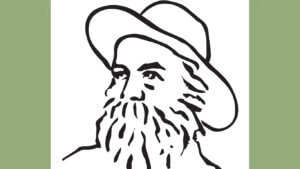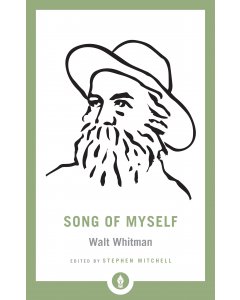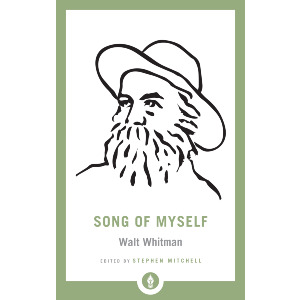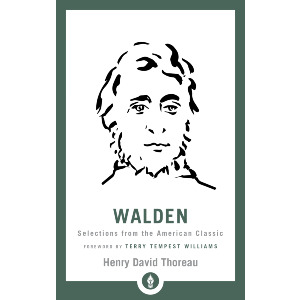Walt Whitman
Walt Whitman (1819-1892) is considered by many to be the greatest of all American poets. His collection of poems, Leaves of Grass, in which “Song of Myself” appears, is probably the most influential volume of American literature. Whitman’s work was radically unconventional in both content and technique, with a poetic style that was free and organic in structure.
Walt Whitman
GUIDES

Finding One's Self in the Universe | An Excerpt from Song of Myself
I am enamoured of growing outdoors,
Of men that live among cattle or taste of the ocean or woods,
Of the builders and steerers of ships, of the wielders of axes and mauls, of the drivers of horses,
I can eat and sleep with them week in and week out.
What is commonest and cheapest and nearest and easiest is Me,
Me going in for my chances, spending for vast returns,
Adorning myself to bestow myself on the first that will take me,
Not asking the sky to come down to my goodwill, Scattering it freely forever.
The pure contralto sings in the organloft,
The carpenter dresses his plank . . . . the tongue of his foreplane whistles its wild ascending lisp,
The married and unmarried children ride home to their Thanksgiving dinner,
The pilot seizes the king-pin, he heaves down with a strong arm,
The mate stands braced in the whaleboat, lance and harpoon are ready,
The duck-shooter walks by silent and cautious stretches,
The deacons are ordained with crossed hands at the altar,
The spinning-girl retreats and advances to the hum of the big wheel,
The farmer stops by the bars of a Sunday and looks at the oats and rye,
The lunatic is carried at last to the asylum a confirmed case,
He will never sleep any more as he did in the cot in his mother’s bedroom;
The jour printer with gray head and gaunt jaws works at his case,
He turns his quid of tobacco, his eyes get blurred with the manuscript;
The malformed limbs are tied to the anatomist’s table,
What is removed drops horribly in a pail;
The quadroon girl is sold at the auction-stand
. . . . the drunkard nods by the barroom stove,
The machinist rolls up his sleeves . . . . the policeman travels his beat . . . . the gate-keeper marks who pass,
The young fellow drives the express-wagon . . . .
I love him though I do not know him;
The half-breed straps on his light boots to compete in the race,
The western turkey-shooting draws old and young . . . . some lean on their rifles, some sit on logs,
Out from the crowd steps the marksman and takes his position and levels his piece;
The groups of newly-come immigrants cover the wharf or levee,
The woollypates hoe in the sugarfield, the overseer views them from his saddle;
The bugle calls in the ballroom, the gentlemen run for their partners, the dancers bow to each other;
The youth lies awake in the cedar-roofed garret and harks to the musical rain,
The Wolverine sets traps on the creek that helps fill the Huron,
The reformer ascends the platform, he spouts with his mouth and nose,
The company returns from its excursion, the darkey brings up the rear and bears the well-riddled target,
The squaw wrapt in her yellow-hemmed cloth is offering moccasins and beadbags for sale,
The connoisseur peers along the exhibition-gallery with halfshut eyes bent sideways,
The deckhands make fast the steamboat, the plank is thrown for the shoregoing passengers,
The young sister holds out the skein, the elder sister winds it off in a ball and stops now and then for the knots,
The one-year wife is recovering and happy, a week ago she bore her first child,
The cleanhaired Yankee girl works with her sewing- machine or in the factory or mill,
The nine months’ gone is in the parturition chamber, her faintness and pains are advancing;
The pavingman leans on his twohanded rammer—the reporter’s lead flies swiftly over the notebook—the signpainter is lettering with red and gold,
The canal-boy trots on the towpath—the bookkeeper counts at his desk—the shoemaker waxes his thread,
The conductor beats time for the band and all the performers follow him,
The child is baptised—the convert is making his first professions,
The regatta is spread on the bay . . . . how the white sails sparkle!
The drover watches his drove, he sings out to them that would stray,
The pedlar sweats with his pack on his back—the purchaser higgles about the odd cent,
The camera and plate are prepared, the lady must sit for her daguerreotype,
The bride unrumples her white dress, the minutehand of the clock moves slowly,
The opium eater reclines with rigid head and just opened lips,
The prostitute draggles her shawl, her bonnet bobs on her tipsy and pimpled neck,
The crowd laugh at her blackguard oaths, the men jeer and wink to each other,
(Miserable! I do not laugh at your oaths nor jeer you,)
The President holds a cabinet council, he is surrounded by the great secretaries,
On the piazza walk five friendly matrons with twined arms;
The crew of the fish-smack pack repeated layers of halibut in the hold,
The Missourian crosses the plains toting his wares and his cattle,
The fare-collector goes through the train—he gives notice by the jingling of loose change,
The floormen are laying the floor—the tinners are tinning the roof—the masons are calling for mortar,
In single file each shouldering his hod pass onward the laborers;
Seasons pursuing each other the indescribable crowd is gathered . . . . it is the Fourth of July . . . . what salutes of cannon and small arms!
Seasons pursuing each other the plougher ploughs and the mower mows and the wintergrain falls in the ground;
Off on the lakes the pikefisher watches and waits by the hole in the frozen surface,
The stumps stand thick round the clearing, the squatter strikes deep with his axe,
The flatboatmen make fast toward dusk near the cottonwood or pekantrees,
The coon-seekers go now through the regions of the Red river, or through those drained by the Tennessee, or through those of the Arkansas,
The torches shine in the dark that hangs on the Chattahoochee or Altamahaw;
Patriarchs sit at supper with sons and grandsons and great grandsons around them,
In walls of adobe, in canvas tents, rest hunters and trappers after their day’s sport.
The city sleeps and the country sleeps,
The living sleep for their time . . . . the dead sleep for their time,
The old husband sleeps by his wife and the young husband sleeps by his wife;
And these one and all tend inward to me, and I tend outward to them,
And such as it is to be of these more or less I am.
I love him though I do not know him
I am of old and young, of the foolish as much as the wise,
Regardless of others, ever regardful of others,
Maternal as well as paternal, a child as well as a man,
Stuffed with the stuff that is coarse, and stuffed with the stuff that is fine,
One of the great nation, the nation of many nations—the smallest the same and the largest the same,
A southerner soon as a northerner, a planter nonchalant and hospitable,
A Yankee bound my own way . . . . ready for trade . . . . my joints the limberest joints on earth and the sternest joints on earth,
A Kentuckian walking the vale of the Elkhorn in my deerskin leggings,
A boatman over the lakes or bays or along coasts . . . . a Hoosier, a Badger, a Buckeye,
A Louisianian or Georgian, a poke-easy from sandhills and pines,
At home on Canadian snowshoes or up in the bush, or with fishermen off Newfoundland,
At home in the fleet of iceboats, sailing with the rest and tacking,
At home on the hills of Vermont or in the woods of Maine or the Texan ranch,
Comrade of Californians . . . . comrade of free northwesterners, loving their big proportions,
Comrade of raftsmen and coalmen—comrade of all who shake hands and welcome to drink and meat;
A learner with the simplest, a teacher of the thoughtfulest,
A novice beginning experient of myriads of seasons,
Of every hue and trade and rank, of every caste and religion,
Not merely of the New World but of Africa Europe or Asia . . . . a wandering savage,
A farmer, mechanic, or artist . . . . a gentleman, sailor, lover or quaker,
A prisoner, fancy-man, rowdy, lawyer, physician or priest.
I resist anything better than my own diversity,
And breathe the air and leave plenty after me,
And am not stuck up, and am in my place.
The moth and the fisheggs are in their place,
The suns I see and the suns I cannot see are in their place,
The palpable is in its place and the impalpable is in its place.
These are the thoughts of all men in all ages and lands, they are not original with me,
If they are not yours as much as mine they are nothing or next to nothing,
If they do not enclose everything they are next to nothing,
If they are not the riddle and the untying of the riddle they are nothing,
If they are not just as close as they are distant they are nothing.
This is the grass that grows wherever the land is and the water is,
This is the common air that bathes the globe.
This is the breath of laws and songs and behavior,
This is the tasteless water of souls . . . . this is the true sustenance,
It is for the illiterate . . . . it is for the judges of the supreme court . . . . it is for the federal capitol and the state capitols,
It is for the admirable communes of literary men and composers and singers and lecturers and engineers and savans,
It is for the endless races of working people and farmers and seamen.
This is the trill of a thousand clear cornets and scream of the octave flute and strike of triangles.
I play not a march for victors only . . . . I play great marches for conquered and slain persons.
Have you heard that it was good to gain the day?
I also say it is good to fall . . . . battles are lost in the same spirit in which they are won.
I sound triumphal drums for the dead . . . . I fling through my embouchures the loudest and gayest music to them,
Vivas to those who have failed, and to those whose war-vessels sank in the sea, and those themselves who sank in the sea,
And to all generals that lost engagements, and all
overcome heroes, and the numberless unknown heroes equal to the greatest heroes known.
I am of old and young, of the foolish as much as the wise
This is the meal pleasantly set . . . . this is the meat and drink for natural hunger,
It is for the wicked just the same as the righteous . . . . I make appointments with all,
I will not have a single person slighted or left away,
The keptwoman and sponger and thief are hereby invited . . . . the heavy-lipped slave is invited . . . . the venerealee is invited,
There shall be no difference between them and the rest.
This is the press of a bashful hand . . . . this is the float and odor of hair,
This is the touch of my lips to yours . . . . this is the murmur of yearning,
This is the far-off depth and height reflecting my own face,
This is the thoughtful merge of myself and the outlet again.
Do you guess I have some intricate purpose?
Well I have . . . . for the April rain has, and the mica on the side of a rock has.
Do you take it I would astonish?
Does the daylight astonish? or the early redstart twittering through the woods?
Do I astonish more than they?
This hour I tell things in confidence,
I might not tell everybody but I will tell you.
Who goes there! hankering, gross, mystical, nude? How is it I extract strength from the beef I eat?
What is a man anyhow? What am I? and what are you?
All I mark as my own you shall offset it with your own,
Else it were time lost listening to me.
I do not snivel that snivel the world over,
That months are vacuums and the ground but wallow and filth,
That life is a suck and a sell, and nothing remains at the end but threadbare crape and tears.
Whimpering and truckling fold with powders for invalids . . . . conformity goes to the fourth removed,
I cock my hat as I please indoors or out.
Related Books
Walt Whitman (1819—1892) is considered by many to be the greatest of all American poets. His collection of poems, Leaves of Grass, in which “Song of Myself” appears, is probably the most influential volume of American literature. Whitman’s work was radically unconventional in both content and technique, with a poetic style that was free and organic in structure.





